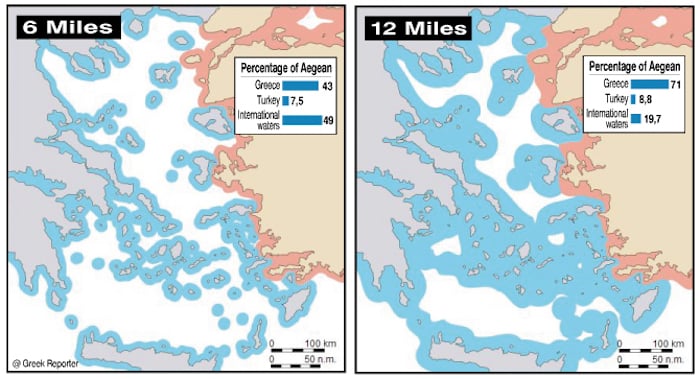
Greece is firm on its position to extend its territorial waters to twelve nautical miles in the Aegean as is clearly indicated by international law and specifically by the UN’s Treaty on the Law of the Sea (UNCLOS).
Despite Turkey’s threats that the extension of Greek territorial waters is a cause of war, Athens has not moved from its longstanding position that the expansion of territorial waters to twelve nautical miles is an inalienable sovereign right.
Greece has refrained from doing so, insisting that it will choose the time when appropriate.
In 2021, Greece extended its territorial waters in the Ionian Sea to twelve miles. “Greece is growing,” PM Kyriakos Mitsotakis said during a parliamentary debate explaining that the country’s territorial waters from the northernmost Ionian islands to Cape Tainaro in the Peloponnese will be extended to twelve nautical miles.
The move constituted the first extension of the country’s sovereignty since the Dodecanese became part of Greece in 1947.
Extension in the Ionian Sea did not lead to any objections from its neighbors, Italy and Albania.
However, the Aegean is a different proposition altogether. In the past, Turkey has threatened that such a move—which it says in effect turns the Aegean into a Greek lake—is a casus belli, a cause for war.
“I hope they won’t make a mistake and think of extending the territorial waters to twelve miles,” Turkish Defense Minister Hulusi Akar said earlier in 2022. “This is a wrong calculation.”
“They should not try to test us,” Akar added, stressing that Greece should best make do with its existing six miles of territorial waters.
Greece, territorial waters, and the Law of the Sea
Territorial waters are an extension to the sea of the national sovereignty of a country beyond its shores. They are considered to be part of the country’s national territory.
They give the littoral state full control over air navigation in the airspace above and partial control over shipping although foreign ships—both civil and military—are normally guaranteed innocent passage through territorial waters.
Greece has a legal right to extend its territorial sea to twelve nautical miles, as provided for by the United Nations Convention on the Law of the Sea.
Virtually all coastal states abide by the Law of the Sea. Since 1964, Turkey has expanded its territorial waters in the Black Sea and the Mediterranean to twelve nautical miles.
When ratifying the Convention, Greece tabled a statement declaring that “the time and place of exercising these rights…is a matter arising from its national strategy.”
Successive Greek governments refrained from exercising this legal right. Six nautical miles have been in force since 1936, and, since then, there has been a continuing debate on whether Greece should extend to twelve nautical miles.
Turkey’s threat
If Greece extends its territorial waters in the Aegean, it will increase its control from the current forty-three percent to seventy-one percent. International waters will be reduced from forty-nine percent to less than twenty percent.
This is why Turkey has threatened war. It claims that the Aegean is a special case, and, if the provisions of the Law of the Sea are applied, Turkey will be cut off from the Aegean.
Greece rejects Turkey’s arguments saying that under the Law of the Sea, the right of passage is fully safeguarded and even expanded.
By making use of these rights, even warships from other countries can move unperturbed through Greek territorial waters and through narrow passages between the islands, as is the case today.
Tensions over the twelve-mile question ran highest between the two countries in the early 1990s when the Law of the Sea was going to come into force.
On June 9, 1995, the Turkish Parliament officially declared that unilateral action by Greece would constitute a casus belli.
This declaration has been condemned by Greece as a violation of the Charter of the United Nations, which forbids “the threat or use of force against the territorial integrity or political independence of any state.”
See all the latest news from Greece and the world at Greekreporter.com. Contact our newsroom to report an update or send your story, photos and videos. Follow GR on Google News and subscribe here to our daily email!



